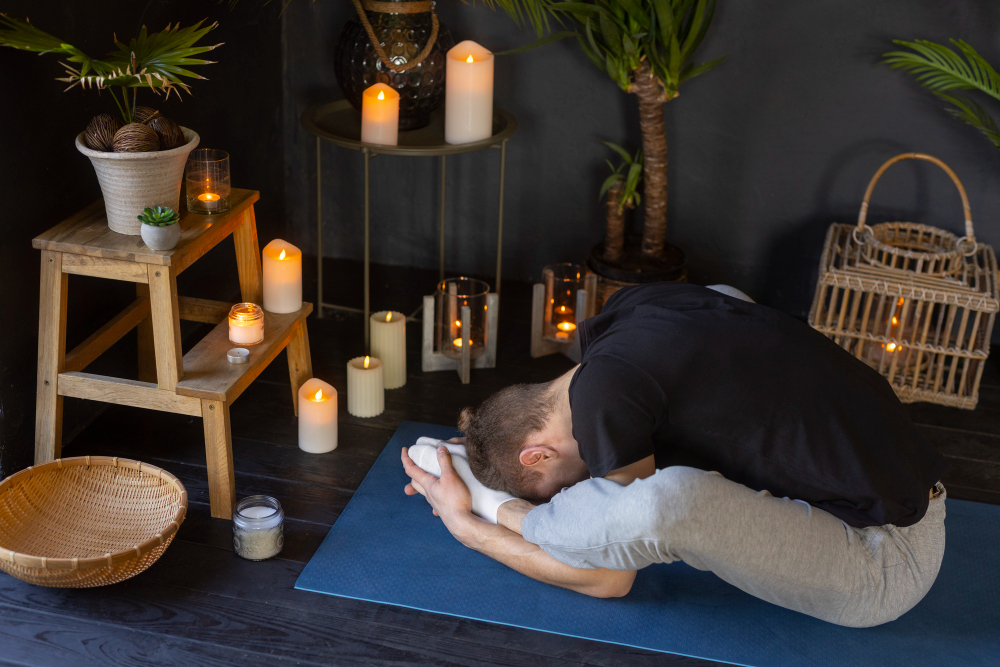Insomnia means trouble falling or staying asleep. Many people in cities like New York and Los Angeles struggle with it. Often, stress and anxiety make insomnia worse. Because of this, sleep problems can affect your mood, focus, and health. However, natural insomnia remedies like yoga and naturopathy can help manage stress and improve sleep. In this blog, you will learn about symptoms, causes, and natural ways to prevent insomnia.
Symptoms of Insomnia
Insomnia can show up in many ways. For example, you might notice:Difficulty falling asleep at nightWaking up often during the nightFeeling tired even after a full night’s sleepWaking up too early and not falling back asleepDaytime tiredness or low energyTrouble focusing or remembering thingsFeeling irritable or moody
Sometimes, these symptoms last for weeks. In that case, it is important to seek help.
Causes of Insomnia
Many things can cause insomnia. However, stress and anxiety are two of the most common reasons. For instance, worrying about work, family, or health can keep your mind active at night. As a result, you may find it hard to relax and sleep. Other causes include:Poor sleep habits, like using screens before bedIrregular sleep schedulesDrinking caffeine or alcohol late in the dayMedical conditions, such as pain or breathing problems
Still, stress and anxiety often play the biggest role in ongoing sleep problems.
Diagnosis
Doctors diagnose insomnia by asking about your sleep habits and daily routine. They may also check for signs of stress and anxiety. Sometimes, you might fill out a sleep diary or answer questions about your mood. In some cases, a doctor may suggest a sleep study. This helps rule out other sleep disorders. However, most of the time, your answers and symptoms guide the diagnosis.
Yoga and Naturopathy for Insomnia
Yoga and naturopathy offer gentle, natural insomnia remedies. These methods help calm your mind and body. For example, certain yoga poses and breathing exercises can lower stress and anxiety. Here are some proven techniques:
Yoga Poses
Child’s Pose (Balasana): Relaxes the back and mindLegs-Up-the-Wall Pose (Viparita Karani): Reduces tension and calms nervesCorpse Pose (Shavasana): Promotes deep relaxation before sleep
Breathing Exercises
Alternate Nostril Breathing: Balances the mind and eases anxietyDeep Belly Breathing: Slows the heart rate and helps you relax
Naturopathic Practices
Herbal teas like chamomile or valerian root for calming effectsAromatherapy with lavender oil to promote restful sleepWarm baths with Epsom salts to relax muscles
According to the World Health Organization and peer-reviewed studies, these practices can improve sleep quality and reduce stress.
Lifestyle Guidance
Healthy daily habits can prevent insomnia. For instance, you can:Go to bed and wake up at the same time each dayAvoid screens at least one hour before bedtimeEat light, healthy meals in the eveningLimit caffeine and alcohol, especially after noonPractice gentle yoga or stretching before bedTry relaxation techniques, such as meditation or listening to soft music
Additionally, keeping your bedroom cool, dark, and quiet can help you sleep better.
Prevention
Managing stress and anxiety is key to preventing insomnia. You can try these strategies:Practice yoga or deep breathing dailySet aside time to relax and unwind each eveningTalk to friends or family about your worriesStay active with regular exercise, but not too close to bedtimeKeep a journal to write down thoughts before bed
With these steps, you can lower stress and enjoy better sleep for years to come.
For personalized insomnia management advice, consult a wellness specialist or healthcare provider.



